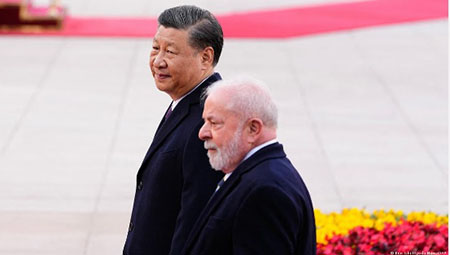Special to WorldTribune.com
 By John J. Metzler, April 21, 2023
By John J. Metzler, April 21, 2023
The writing was on the wall. But when Brazil’s leftwing president Luiz Inacio “Lula” da Silva visited China recently, he flamboyantly underscored economic and security ties between Latin America’s largest democracy and the world’s largest dictatorship.
Significantly, he took steps to decouple much of Brazil’s vibrant commerce from using the U.S. dollar and shifting the trade instead to the Chinese currency, the Yuan.
Effectively Lula threw a BRIC at the U.S. Dollar, and the game is only getting started.
The BRICS? The BRICS form an informal economic grouping of rising economies which include Brazil, Russia, India, China and South Africa. Founded in 2009, they serve as a kind of alternative powerhouse grouping to the Group of 7 leading advanced economies.

During a high profile visit by the Brazilian president to Beijing, Lula was feted by his largest trading partner and moreover took the opportunity to expand its political and diplomatic relations with China. Communist party Chairman and President Xi Jinping stated, “As comprehensive strategic partners, China and Brazil share extensive common interests.”
The U.S. and Brazil, though traditionally major trading partners, has been pushed aside by the People’s Republic of China who became Brazil’s number one commercial partner since 2009.
Bilateral trade between Brazil and China reached a record of $150 billion in 2022. During that same period U.S. two-way trade with Brazil stood at $92 billion.
Equally between 2007 and 2020, Brazil emerged as the primary destination for Chinese investment in South America reaching $70 billion. Beijing views resource rich Brazil as an economic and political giant, not only among the BRICS but as a player in what’s generally described as the Global South.
Lula (77) a former left wing firebrand labor leader, led Brazil as president from 2003 to 2010; he was later imprisoned for two years on corruption charges. On his release he again ran for the presidency last year and narrowly defeated conservative nationalist Jair Bolsonaro.
Lula has re-embraced Brazil’s enchantment with China and made his fifth visit to the Mainland along with 200 political and business figures.
Lula slammed the U.S. Dollar as the primary currency for global trade; “Who decided the dollar would be the (world’s) currency?” Speaking in Shanghai at a ceremony to inaugurate his political ally Dilma Rousseff as president of the New Development Bank set up by the BRICS members, he exhorted, “Why can’t a bank like the BRICS bank have a currency to support trade between Brazil and China, between Brazil and the other BRICS countries?” Rousseff, also a former Brazilian leader, currently runs the BRIC Bank in Shanghai.
In discussions with Chinese officials, an exuberant Lula asserted that world geopolitics must change supported by both China and Brazil. He insisted on trading in local currencies pushing aside the American dollar. Lula said, “We want to raise the level of the strategic partnership between our countries, expand trade flows and, together with China, balance world geopolitics.”
The Brazilian government announced a deal with China to trade in their own currencies, eliminating the U.S. Dollar as exchange. Saudi /Chinese oil sales are slated to do the same thing with some trade in Yuan. At this point such a shift is more semantic and symbolic; In the medium term however, such moves away from the American currency seriously undermine the role of the Dollar as the dominant Reserve currency.
|
There’s a notable political sea change transpiring. Lacking leadership in Washington, the U.S. overlooks the vital importance of Latin American commercial links and seems oblivious to the steady weakening of the American currency. |
Lula’s stance towards helping Ukraine in its conflict with Russia can be described as tepid at best. He supports Beijing’s twelve point “peace plan” to end the war adding that Brazil can create a “Peace Club” to end the conflict.
Thus, Brazil refrains from sending military supplies to Ukraine despite U.S. and NATO prodding; Its government has turned down numerous Ukrainian requests to purchase weapons from Brazil’s significant defense industry. Lula commented, “I don’t want to join the war…I want to end the war.”
Nonetheless Lula has carefully criticized Russian actions in Ukraine; Brazil voted in the UN General Assembly condemning Moscow’s invasion and occupation. Currently Brazil is serving a two year tenure on the UN Security Council. Recently Brazil along with Russia and China supported a stillborn draft resolution in the UN Security Council to investigate the mysterious explosions in September on the Nord Stream II gas pipeline linking Russia and Germany.
There’s a notable political sea change transpiring. Lacking leadership in Washington, the U.S. overlooks the vital importance of Latin American commercial links and seems oblivious to the steady weakening of the American currency.
John J. Metzler is a United Nations correspondent covering diplomatic and defense issues. He is the author of Divided Dynamism the Diplomacy of Separated Nations: Germany, Korea, China (2014). [See pre-2011 Archives]
